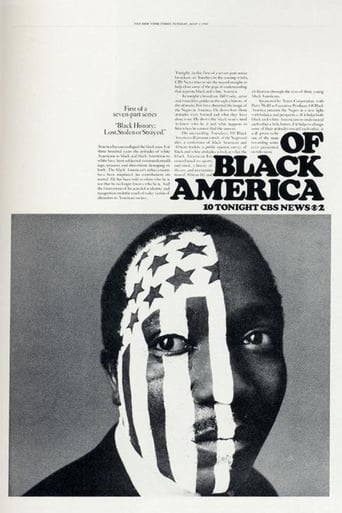
Of Black America (1968)
Of Black America was a series of seven one-hour documentaries presented by CBS News in the summer of 1968, at the end of the Civil Rights Movement and during a time of racial unrest (Martin Luther King had been assassinated that spring and riots in many cities had followed). The groundbreaking[1] series explored various aspects of the history and current state of African-American community.
-

Episode 1 - Black History: Lost, Stolen, Strayed
Release Date: 1968-07-02Black American heritage, a psychiatrist analyzes African-American and white children's drawings, characterizations of blacks in film, preparing black children for public school. Amos 'n' Andy appear.
-

Episode 2 - The Black Soldier
Release Date: 1968-07-09History of the military role of African-Americans, from the American Revolutionary War to the Vietnam War which was then being fought.
-

Episode 3 - Black World
Release Date: 1968-07-16Kinship and degree of cultural interchange between Black America and Black Africa is covered. Ghanaian figures Tom Mboya and Alexander Kwapong appear, along with African-American leaders.
-

Episode 4 - Body and Soul
Release Date: 1968-07-30Two parts, one on African-American athletes (including clips of Joe Louis, Jackie Robinson, Althea Gibson, Arthur Ashe, Bill Russell, and Jesse Owens) and one, featuring Ray Charles, on musicians (including clips of Lester Young, Billie Holiday, Duke Ellington, Count Basie, Louis Armstrong, Nat "King" Cole, and Aretha Franklin).
-

Episode 5 - The Heritage of Slavery
Release Date: 1968-08-13Current attitudes of white and black Americans toward African-American history are discussed. Explanation of the slave trade, footage shot in Charleston, South Carolina including the Old Slave Mart Museum, interviews with activist Bill Saunders and editor Lerone Bennett Jr.
-

Episode 6 - In Search of a Past
Release Date: 1968-08-20 -

Episode 7 - Portrait in Black and White
Release Date: 1968-09-02Results of a CBS News poll measuring racial attitudes. Walker presents on white racism and changes in white attitudes, Kuralt on African-American extremism and also on black pride.